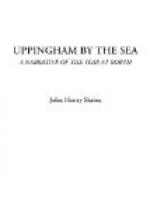Our prosperity was suddenly staggered. Just five weeks after the return a case of scarlet fever occurred, followed in the course of the week by half-a-dozen more. An outbreak of this kind is too common an incident in a large school to merit much surprise or great alarm. But then our circumstances were exceptional. If the infection spread, it might be difficult to find hospital room; to communicate it to the villagers, as might easily befall, would be an unhappy return for their own ready hospitality; and then how miserable to have fled from sickness at Uppingham, and find it had followed us to Borth, as if, like the haunted family of the poem, “we had packed the thing among the beds.” Already there came news which raised unspoken doubts of our returning home after Christmas. How, then, if we could not stay here? The question was hard to answer.
It is, however, a well-recognised fact that epidemics of this kind are very much under the control of scientific precautions, and as we had good advice on the spot, no time was lost in stamping out the plague. War is not made with rose-water (it certainly was not rose-water which reeked along our passages), and fever germs can be exterminated, it seems, by nothing less exasperatingly unsavoury than carbolic acid, an agency which was laid on without any ruth. Grumblers were offered the alternative of being smoked with sulphur. Some complained of sore throats, contracted, they said, from the fumes of the disinfectant, and declared that the remedy, like vaccination, was only a mitigated form of the disorder. The landlords of our studies looked on with irresolute wonder, when some of us sprinkled their floors with a potent decoction poured from watering-pots. Most of them regarded it as a kind of magical rite into which it would not be seemly to inquire. In one house a practical seaman, late home from a cruise, took a less reverent view of the lustration, and uttered hints of what he would do to the perpetrators’ heads if their acid touched his carpets again. Probably the best disinfectant applied was the clear strong wind, which ten days after the first case succeeded the previous relaxing weather. All windows and doors were ordered wide open for the free passage of the blast; and the boys were directed to bring down their rugs, great-coats, and dressing-gowns, and anything of the kind which might be supposed to harbour mischief, and spread them for purification on the pebbles of the beach. It will be believed the scene was a quaint one, however it might remind the scholar of the idyllic laundry scene by the Phaeacian shore, where Nausicaa and her maidens:
[Greek verse]




